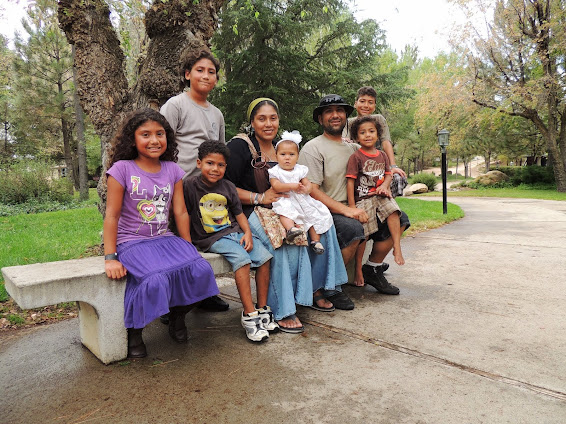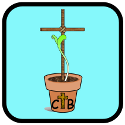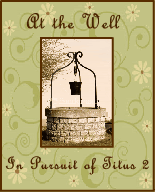A Word Study by Joan!
Here is a study on the Rod verses by Joan: (her site is below)
http://www.suite101.com/myhome.cfm/hsmomof4
The Biblical Rod The "Rod" or "Shebet": An In-depth Examination
A close examination of the "rod" Scriptures in Proverbs:
Which verses are being referred to as the "rod" scriptures?
Pr 13:24 He that spareth his rod hateth his son: but he that loveth him chasteneth him betimes.
Pr 22:15 Foolishness is bound in the heart of a child; but the rod of correction shall drive it far from him.
Pr 23:13 Withhold not correction from the child: for if thou beatest him with the rod, he shall not die.
Pr 23:14 Thou shalt beat him with the rod, and shalt deliver his soul from hell.
Pr 29:15 The rod and reproof give wisdom: but a child left to himself bringeth his mother to shame.
The word rod is "shebet" in Hebrew. This word is defined as following in Strong's Hebrew Lexicon #7626: rod, staff, branch, offshoot, club, sceptre, tribe a. rod, staff b. shaft (of spear, dart) c. club (of shepherd's implement) d. truncheon, sceptre (mark of authority) e. clan, tribe
Strong's definition: From an unused root probably meaning to branch off; a scion, for example literally a stick (for punishing, writing, fighting, walking, ruling, etc.) or figuratively a clan.
King James Word Usage tribe 140, rod 34, sceptre 10, staff 2, miscellaneous 4
Matteh is another Hebrew word for rod. This word can mean branch as a vine and is not used here. Maqqel, which has no meaning that can be applied here and is not used in this Scripture anyway. Choter, another Hebrew word, is branch, twig, rod and is not used here.
Therefore, the focus is on shebet.
There are 31 other Scriptures using this word, translated "rod" in the KJV. These verses will be grouped into categories according to how the word "rod" (translated from "shebet") is used.
THE ROD OF A SHEEP HERDER OR AS AN INSTRUMENT OR TOOL
Leviticus 27:32: And concerning the tithe of the herd, or of the flock, even of whatsoever passeth under the rod, the tenth shall be holy unto the LORD. Psalm 23:4: Yea, though I walk through the valley of the shadow of death, I will fear no evil: for thou art with me; thy rod and thy staff they comfort me. Psalm 2:9: Thou shalt break them with a rod of iron; thou shalt dash them in pieces like a potter's vessel. Isaiah 28:27: For the fitches are not threshed with a threshing instrument, neither is a cart wheel turned about upon the cummin; but the fitches are beaten out with a staff, and the cummin with a rod. Exodus 21:20: And if a man smite his servant, or his maid, with a rod, and he die under his hand; he shall be surely punished.
SYMBOLIZING DIRECT HERITAGE FROM GOD (offshoot)
Psalm 74:2: Remember thy congregation, which thou hast purchased of old; the rod of thine inheritance, which thou hast redeemed; this mount Zion, wherein thou hast dwelt Jeremiah 10:16: The portion of Jacob is not like them: for he is the former of all things; and Israel is the rod of his inheritance: The LORD of hosts is his name. Jeremiah 51:19: The portion of Jacob is not like them; for he is the former of all things: and Israel is the rod of his inheritance: the LORD of hosts is his name.
SYMBOLIZING THE AUTHORITY OF THE WICKED
Psalm 125:3: For the rod of the wicked shall not rest upon the lot of the righteous; lest the righteous put forth their hands unto iniquity. Proverbs 22:8: He that soweth iniquity shall reap vanity: and the rod of his anger shall fail.
A ROD TO BE USED ON A FOOL (Fool meaning stupid or silly, literally meaning fat...has a connotation of cocky)
Proverbs 10:13: In the lips of him that hath understanding wisdom is found: but a rod is for the back of him that is void of understanding. Proverbs 26:3: A whip for the horse, a bridle for the ass, and a rod for the fool's back.
SYMBOLIZING MAN'S AUTHORITY
II Samuel 7:14: I will be his father, and he shall be my son. If he commit iniquity, I will chasten him with the rod of men, and with the stripes of the children of men: Ezekiel 19:11: And she had strong rods for the sceptres of them that bare rule, and her stature was exalted among the thick branches, and she appeared in her height with the multitude of her branches. Ezekiel 19:14: And fire is gone out of a rod of her branches, which hath devoured her fruit, so that she hath no strong rod to be a sceptre to rule. This is a lamentation, and shall be for a lamentation.
SYMBOLIZING GOD'S AUTHORITY
Job 9:34: Let him take his rod away from me, and let not his fear terrify me: Job 21:9: Their houses are safe from fear, neither is the rod of God upon them. Psalm 89:32: Then will I visit their transgression with the rod, and their iniquity with stripes. Isaiah 10:5: O Assyrian, the rod of mine anger, and the staff in their hand is mine indignation Isaiah 10:15: Shall the axe boast itself against him that heweth therewith? or shall the saw magnify itself against him that shaketh it? as if the rod should shake itself against them that lift it up, or as if the staff should lift up itself, as if it were no wood.
Isaiah 11:4: But with righteousness shall he judge the poor, and reprove with equity for the meek of the earth: and he shall smite the earth with the rod of his mouth, and with the breath of his lips shall he slay the wicked. Lamentations 3:1: I am the man that hath seen affliction by the rod of his wrath. Micah 7:14: Feed thy people with thy rod, the flock of thine heritage, which dwell solitarily in the wood, in the midst of Carmel: let them feed in Bashan and Gilead, as in the days of old. Ezekiel 20:37: And I will cause you to pass under the rod, and I will bring you into the bond of the covenant:
Ezekiel 21:10: It is sharpened to make a sore slaughter; it is furbished that it may glitter: should we then make mirth? it contemneth the rod of my son, as every tree.
Ezekiel 21:13: Because it is a trial, and what if the sword contemn even the rod? it shall be no more, saith the Lord GOD.
SYMBOLIZING THE AUTHORITY OF A NATION
Isaiah 9:4: For thou hast broken the yoke of his burden, and the staff of his shoulder, the rod of his oppressor, as in the day of Midian. Isaiah 14:29: Rejoice not thou, whole Palestina, because the rod of him that smote thee is broken: for out of the serpent's root shall come forth a cockatrice, and his fruit shall be a fiery flying serpent.
Isaiah 30:31: For through the voice of the LORD shall the Assyrian be beaten down, which smote with a rod. Micah 5:1: Now gather thyself in troops, O daughter of troops: he hath laid siege against us: they shall smite the judge of Israel with a rod upon the cheek.
Thus all 36 places where this word is used "rod" in the KJV has been recorded in conjunction with the full counsel of God.
There are only a few places that "shebet" is possibly referring to a literal rod in connection with hitting someone.
First let us look at Exodus 21:20:
Exodus 21:20: And if a man smite his servant, or his maid, with a rod, and he die under his hand; he shall be surely punished.
This Scripture in Exodus says that if this rod were used on a maid or servant and killed them that it was punishable. So, one can see that it had to be a heavy duty instrument capable of killing someone which would be consistent with the idea of a staff or club. If it is ok to spank a child using this instrument, then it is not mentioned here and if it were, then the child could die by it's use.
Next, one should examine the meaning of "the stripes of the children of men" in II Samuel 7:14:
II Samuel 7:14: I will be his father, and he shall be my son. If he commit iniquity, I will chasten him with the rod of men, and with the stripes of the children of men:
Here is a lengthy quote from Matthew Henry's Commentary on this particular verse:
I will be his father, and he shall be my son. We need no more to make us and ours happy than to have God to be a Father to us and them; and all those to whom God is a Father he by his grace makes his sons, by giving them the disposition of children. If he be a careful, tender, bountiful Father to us, we must be obedient, tractable, dutiful children to him. The promise here speaks as unto sons. [1.] That his Father would correct him when there was occasion; for what son is he whom the Father chasteneth not? Afflictions are an article of the covenant, and are not only consistent with, but flow from, God's fatherly love. "If he commit iniquity, as it proved he did
(1 Ki. 11:1), I will chasten him to bring him to repentance, but it shall be with the rod of men, such a rod as men may wieldÂ-I will not plead against him with the great power of God,'' Job 23:6. Or rather such a rod as men may bear Â-"I will consider his frame, and correct him with all possible tenderness and compassion when there is need, and no more than there is need of; it shall be with the stripes, the touches (so the word is) of the children of men; not a stroke, or wound, but a gentle touch.''
[2.] That yet he would not disinherit him (v. 15): My mercy (and that is the inheritance of sons) shall not depart from him. The revolt of the ten tribes from the house of David was their correction for iniquity, but the constant adherence of the other two to that family, which was a competent support of the royal dignity, perpetuated the mercy of God to the seed of David, according to this promise; though that family was cut short, yet it was not cut off, as the house of Saul was.
Never any other family swayed the sceptre of Judah than that of David. This is that covenant of royalty celebrated (Ps. 89:3, etc.) as typical of the covenant of redemption and grace. 2. Others of them relate to Christ, who is often called David and the Son of David, that Son of David to whom these promises pointed and in whom they had their full accomplishment. He was of the se
When one observes the use of the rod on fools, this would be adults who are "fools" because they are grown and still have no self-control. It would be comparable to a criminal being beaten. This is not speaking of a young child. There are examples of criminals being beaten in Scripture. There are NO examples of children being beaten with any rod.
In most other instances the word "rod" is used to symbolize God's authority or the authority of a nation.
SYMBOLIZING THE AUTHORITY OF PARENTS
Upon reading the "shebet" passages in Proverbs, one will notice that you can always substitute the word "authority" for "rod". "Rod" is referring to God's authority and the authority of nations in the above verses. Thus, the word "rod" is referring to a parent's authority in all five of the Proverbs references, including the following verses:
Pr 23:13 Withhold not correction from the child: for if thou beatest him with the rod, he shall not die. Pr 23:14 Thou shalt beat him with the rod, and shalt deliver his soul from hell.
In the preceding verses, one can see that the child shall not die with this rod. Yet in Exodus, we saw that a man COULD cause someone to die with a literal shebet. If Scripture were talking about a literal rod here, this would be a contradiction because it says he SHALL NOT die.
A person cannot kill another with their authority. They can be striking (beating) the other person with their authority by using their authority to discipline (teach, disciple, educate, instruct) and guide them.
IF this Scripture were referring to a literal beating, taken in context, it would have to be speaking about a grown child.
The verses before and after Proverbs 23:13-14 was written by a father who was instructing his adolescent son. However, one still has the problem of the contradiction as far as whether or not a "shebet" can cause someone to die.
Another observation worth mention is the Hebrew word translated "child" in the "rod" Scriptures of Proverbs.
This word is "na'ar".
Meaning of "na'ar": a boy, lad, servant, youth, retainer a. boy, lad, youth b. servant, retainer
Concretely a boy (as active), from the age of infancy to adolescence; by implication a servant; also (by interchange of sex) a girl (of similar latitude in age).
The KJV translates it as follows: young man 76, servant 54, child 44, lad 33, young 15, children 7, youth 6, babe 1, boys 1
This word "na'ar" is referring to boys most of the time (since a lad would be a male) and usually young men.
Therefore, *if* one took these Scriptures to mean literal physical punishment, than it would possibly only apply to fathers spanking their sons who are older (since adolescence can go through the early 20's). Most Christian discipline "experts" do not mention this. Yet, if one is to interpret this verse literally, this would have to be the explanation.
Law-based Christian parenting authors say a parent should be able to STOP spanking by the time their children reach 12 or 13, yet according to this Scripture, this parent would not even START using physical punishment until then. These verses, if taken literally, would be referring to this form of punishment as an absolute last resort to save the child (which was possibly a boy only) from hell.
Many Christians have taken FIVE verses and hung a whole child rearing philosophy on them! Parents are told to use this as a primary form of punishment (what these experts refer to as discipline). Some use the word "punishment" and the term "discipline" interchangeably when they mean two entirely different things. These people are basing their theology on nothing more than the traditions of men!
Further, we are told in Deuteronomy 21:18-21:
18 If a man have a stubborn and rebellious son, which will not obey the voice of his father, or the voice of his mother, and that, when they have chastened him, will not hearken unto them: 19 Then shall his father and his mother lay hold on him, and bring him out unto the elders of his city, and unto the gate of his place; 20 And they shall say unto the elders of his city, This our son is stubborn and rebellious, he will not obey our voice; he is a glutton, and a drunkard. 21 And all the men of his city shall stone him with stones, that he die: so shalt thou put evil away from among you; and all Israel shall hear, and fear.
The parents are told first to talk to their child (he has not heard their voice). Then, they are told to chasten him. Chasten simply means correct with words or blows. It seems they were supposed to instruct, then correct him if he did not heed their verbal correction. Then, if this does not work, he is to be stoned.
If we are no longer to stone, then why do we assume we should use physical beatings to bring about repentance? Shouldn't we make examples of a few children and stone them too? Why were they to go ahead and stone them to death if they would not repent and be obedient? This was because the Holy Spirit was not actively convicting hearts and they did not yet have direct access to God.
Jesus said in the case of the adulterous woman to let him who was without sin to cast the first stone. Parents don't stone their kids because the parents themselves are just as much a sinner as their rebellious child.
Jesus was gentle with children. He is a shepherd to the sheep. The shepherd uses HIS rod to guide the sheep, not to beat them! Psalm 23 uses "shebet" to describe the shepherd's "rod". People have mentioned to this author that the shepherd would use his "rod" to break the legs of a wandering sheep to keep it from going away and getting hurt, so this is proof of how we should physically punish our children.
However, this only proves that we should try to keep our children's hearts and keep them on the right path by praying for God to convict and protect them. He is the GREAT Shepherd and He will work in their lives in a much more effective manner than we can. If He chooses to allow some kind of circumstance or situation (to break their legs) in their life, to keep them in the fold, then so be it! He is much stronger than human parents. Our children's "legs can be broken" by natural, spiritual and logical consequences (which God allows in their lives) even more effectively than by man made pain.
Oct 20, 2004
Unless someone care's

Compassion
Compassion Verse
"Lifehouse Anything Skit"
Our Mighty Arrows
















0 comments:
Post a Comment